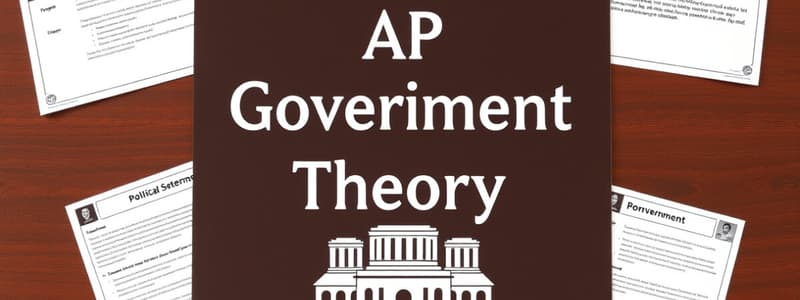Podcast
Questions and Answers
What is the definition of democracy?
What is the definition of democracy?
- A principle that guarantees rights to those who belong to majorities
- A theory that government is weakened by strong groups
- A system of selecting policymakers that ignores public preferences
- A system of selecting policymakers and organizing government so that policy represents and responds to the public's preferences (correct)
What does government refer to?
What does government refer to?
the institutions and processes through which public policies are made for a society
What is hyperpluralism?
What is hyperpluralism?
a theory of government and politics contending that groups are so strong that government is weakened
What are Linkage Institutions?
What are Linkage Institutions?
Define minority rights.
Define minority rights.
What does Policy Agenda refer to?
What does Policy Agenda refer to?
What are Policymaking Institutions?
What are Policymaking Institutions?
Define a Political Issue.
Define a Political Issue.
What is Politics?
What is Politics?
Define Public Policy.
Define Public Policy.
What is the Policymaking System?
What is the Policymaking System?
What is Policy Gridlock?
What is Policy Gridlock?
Define Political Participation.
Define Political Participation.
What are Public Goods?
What are Public Goods?
Define Representation in the context of democracy.
Define Representation in the context of democracy.
What are Single-Issue Groups?
What are Single-Issue Groups?
What is Elite/Class Theory?
What is Elite/Class Theory?
Define Gross Domestic Product (GDP).
Define Gross Domestic Product (GDP).
What is Individualism in American political thought?
What is Individualism in American political thought?
Define Majority Rule.
Define Majority Rule.
What is Pluralist Theory?
What is Pluralist Theory?
Flashcards are hidden until you start studying
Study Notes
Key Concepts in Government and Politics
- Democracy: System for selecting policymakers and organizing government to reflect and respond to public preferences.
- Government: Institutions and processes that create public policies for society as a whole.
- Hyperpluralism: Theory stating that the strength of various groups weakens government effectiveness.
Mechanics of Political Process
- Linkage Institutions: Channels through which public issues and preferences are conveyed to the government agenda.
- Minority Rights: Principle ensuring protection of rights for non-majority groups, allowing them to potentially persuade the majority.
- Policy Agenda: Set of issues gaining significant attention from officials and political participants.
Policymaking Structures
- Policymaking Institutions: Branches of government (Congress, presidency, courts) responsible for addressing political issues; bureaucracy considered a fourth institution.
- Political Issue: Arises from disagreements about a problem and corresponding public policy.
Foundations of Politics
- Politics: The process of electing leaders and shaping their pursued policies, leading to authoritative decisions on public matters.
- Public Policy: Government's response to political issues, taking action concerning specific problems.
Dynamics of Policy Formation
- Policymaking System: Process where public problems are expressed by voters and addressed by policymakers, starting with public needs and expectations.
- Policy Gridlock: Situation where no coalition can form a majority, preventing the establishment of policy and resulting in inaction.
Citizen Engagement and Resources
- Political Participation: Activities through which citizens influence political leader selections and policy decisions, primarily through voting.
- Public Goods: Resources (e.g., clean air, clean water) that are universally available and must be shared by all.
Principles of Representation and Participation
- Representation: Principle highlighting the relationship between a small group of leaders and the larger citizenry.
- Single-issue Groups: Organizations focused on specific interests, often resistant to compromise, attracting politically inexperienced members.
Theories of Governance
- Elite/Class Theory: Contends society is class-divided, with an upper-class elite holding power, overriding formal governmental structures.
- Pluralist Theory: Highlights politics as a competition among groups vying for their preferred policies.
Economic and Ideological Context
- Gross Domestic Product: Total value of all goods and services produced within a nation, serving as a measure of economic activity.
- Individualism: Belief in limited government intervention in personal affairs, significantly influencing the scope of American governance.
- Majority Rule: Core democratic principle asserting that decisions must respect the majority's preferences in elections.
Studying That Suits You
Use AI to generate personalized quizzes and flashcards to suit your learning preferences.




